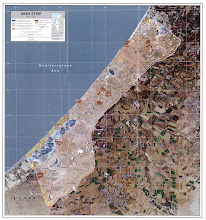The commentary on the stricken Ariel Sharon, PM of Israel, ranges from praise for his peacemaking to condemnation for his peacemaking. Peacemaking? Here's a man whose career was devoted to violence against Palestinians. In 1953 it was Qibya, a village in which Palestinians were subjected to a terrible onslaught by Sharon's Unit 101. As quoted in David Hirst's book The Gun and the Olive Branch, UN military observers reported, "Bullet-riddled bodies near the doorways and multiple bullet hits on the doors of the demolished houses indicated that the inhabitants had been forced to remain inside until their homes were blown up over them.... Witnesses were uniform in describing their experience as a night of horror, during which Israeli soldiers moved about in their village blowing up buildings, firing into doorways and windows with automatic weapons and throwing hand grenades." According to Hirst, 66 men, women, and children died.
Why was the village destroyed? It was punishment because some Palestinians driven from their homes during and after the 1948 Arab-Israeli war had tried to retrieve property, find relatives, or get produce from their own farms.
Sharon also masterminded the 1982 invasion of Lebanon and the bloody assault on Beirut. It was during this time that the Israeli army made it possible for Israel's Lebanese allies to enter the Palestinian refugee camps of Sabra and Shatila and slaughter some 3,000 inhabitants. The invasion of Lebanon, which had President Ronald Reagan's blessing, also saw U.S. warships bombard Beirut with 2,000-pound shells. In 1983 over 240 Marines and other U.S. military personnel died in a truck bombing while sleeping at their headquarters during the U.S. intervention as a so-called peacekeeper. The Israeli invasion is often defended on the grounds that Palestinians had launched violent raids or shelled Israeli settlements across the Israeli-Lebanon border. But according to the U.S. State Department, the border had been quiet under the terms of a cease-fire the previous 11 months before the invasion.
But didn't Sharon see the light later in his career and begin making peace? Saree Makdis writes in the Los Angeles Times, "Sharon's approach to peacemaking in recent years wasn't very different from his approach to war. Extrajudicial assassinations, mass home demolitions, the construction of hideous barriers and walls, population transfers and illegal annexations — these were his stock in trade as 'a man of courage and peace.' ...Some may take comfort in the myth that Sharon was transformed into a peacemaker, but in fact he never deviated from his own 1998 call to 'run and grab as many hilltops' in the occupied territories as possible. His plan for peace with the Palestinians involved grabbing large portions of the West Bank, ultimately annexing them to Israel, and turning over the shattered, encircled, isolated, disconnected and barren fragments of territory left behind to what only a fool would call a Palestinian state. ...His much-ballyhooed withdrawal from Gaza left 1.4 million Palestinians in what is essentially the world's largest prison, cut off from the rest of the world and as subject to Israeli power as before. It also terminated the possibility of a two-state solution to the conflict by condemning Palestinians to whiling away their lives in a series of disconnected Bantustans, ghettos, reservations and strategic hamlets, entirely at the mercy of Israel."
Makdis adds, "[I]t's not really a sacrifice to return something that wasn't yours to begin with."
I expect the canonization to continue as scheduled.
Wednesday, January 11, 2006
Subscribe to:
Post Comments (Atom)





No comments:
Post a Comment